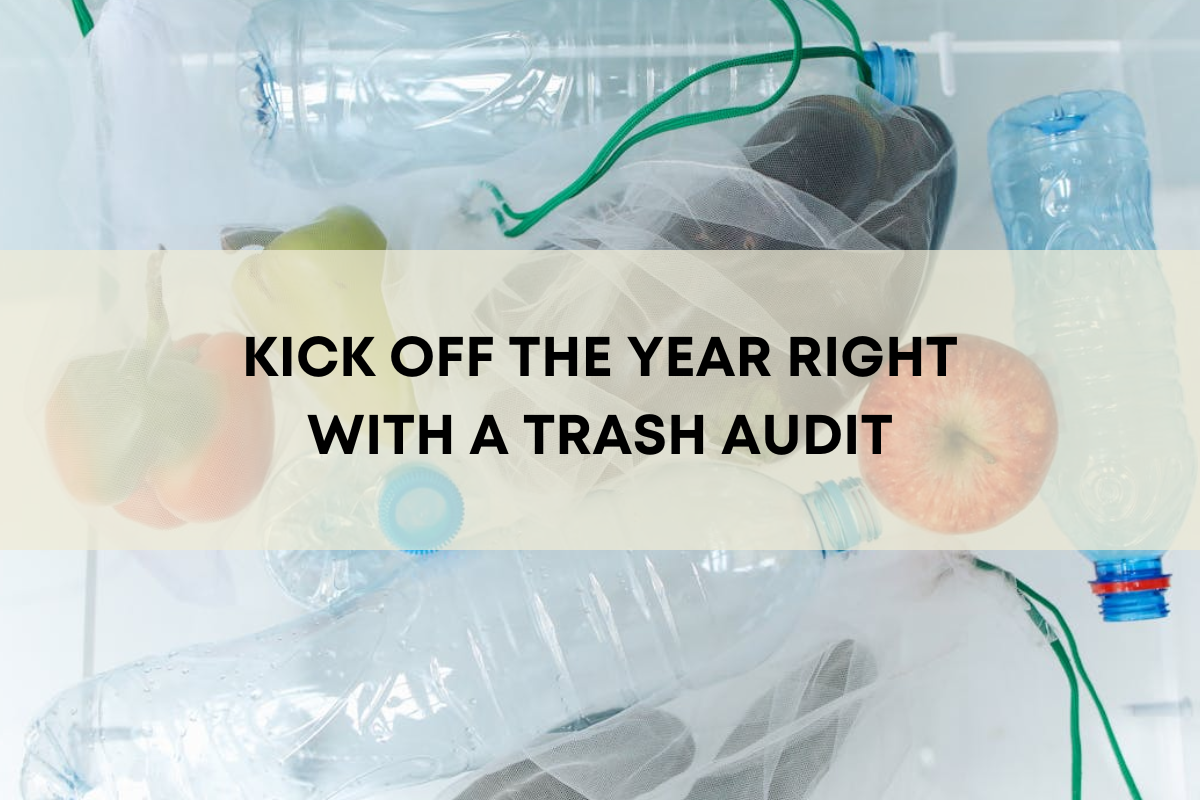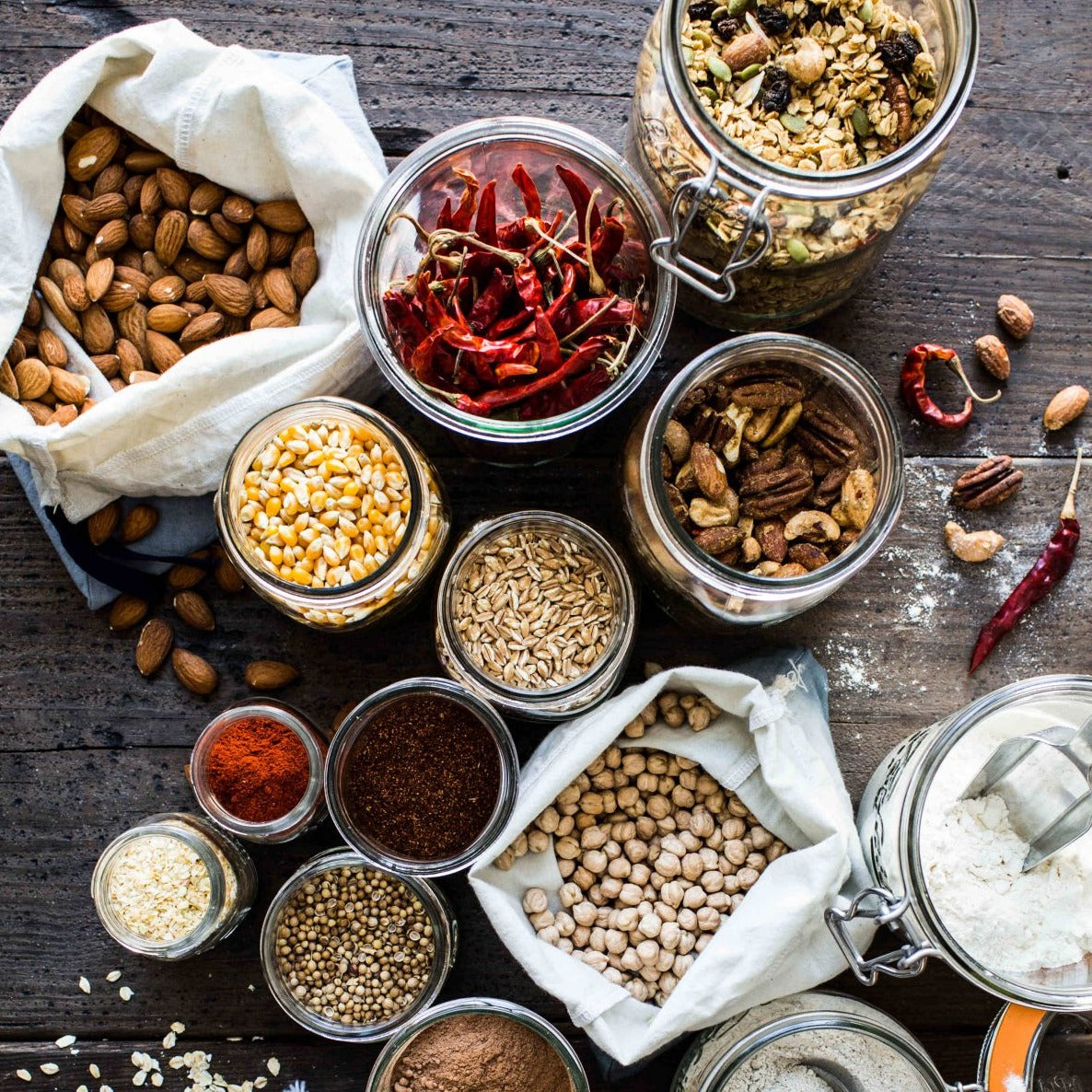Kick The Year Off Right With a Trash Audit

A new year, a new year’s resolution…hopefully a new habit, or perhaps even the beginnings of a new way of living – living more sustainably. What exactly is a sustainable living? According to the UN Environment Programme, sustainable living means “understanding how our lifestyle choices impact the world around us and finding ways for everyone to live better and lighter.”1
Is Sustainable Living All or Nothing?
Sustainable living doesn’t need to be an all or nothing approach. It can involve slowly incorporating new habits that are more sustainable, and replacing old routines with new, more conscious choices that reduce waste or plastic overall. It has been proven that the more people who choose to live sustainably in one part of their lives, the bigger the impact we as a society can have.
According to The Zero Waste Chef, if one person out of 100 cut all of their waste, that would indeed have a positive impact on reducing waste. However, if all 100 people cut just 10% of their waste, the impact would be ten-fold. (Imagine 164,250 pounds per year vs. 1,642,500 pounds per year!!) Of course, if someone wants to strive to cut all of their waste, that is a great goal—but the point is, the more people who cut out waste, the bigger the impact.

Start Your Year on the Right Foot with a Trash Audit
Are you looking to reduce your waste in 2024? Get started with a trash audit, which can lead to even more changes throughout the year.
A trash audit is a great opportunity to look at what kind of waste you are creating in your home. By looking at your trash item by item, you can see where you are creating the most waste and decide what changes you would like to make. We suggest that you attempt to eliminate the items in your trash can that make up the biggest percentage of waste to start, then choose the next item to eliminate after 1 month.
How To Conduct a Trash Audit
Pre-Audit: Learn the Recycling Rules in Your Community (If You Don’t Know Them)As a very, very first step, make sure you know what can be recycled where you live, and how, and ensure you are doing it correctly. You can call your recycling company or look at their website for guidelines if you are unsure. A trash audit will be less helpful if you’re having to assess things you should be recycling already.
Step 1. Change Nothing for One WeekFor one week (or less if things become clear pretty quickly), go about your normal routine and take note of what items are making up the majority of your garbage.
Step 2. Write it DownI recommend keeping notes somewhere, whether on paper or on your phone, of the main offenders you’ve noticed accumulating in your trash. You probably don’t want to go back on Day 7 and sift through the garbage you produced on Day 1 (yuck!).
Step 3. Analyze Your WasteDo you use a quarter roll of paper towels every day? Do you eat a lot of pre-packaged foods? Do you accumulate large numbers of plastic and/or paper bags from stores? Assess your trash and pinpoint which areas the majority of it comes from on a weekly basis.
Step 4. Make a ChangePick a waste category you think you can easily tackle first, and change it. Maybe you could simply swap those paper towels for reusable rags. Or maybe you already have tote bags you could start bringing with you when you shop. Especially if you’re a beginner, pick something EASY. Making the first steps easy will keep you going in the long run. I also recommend ensuring that the first steps cost you nothing, by using things you already own (like cutting up some old tshirts to make your reusable rags).
Step 5. Make Another ChangeAfter you tackle the first zero waste swap, tackle another one (and another and another)! It gets easier as you go and you will likely find more motivation as you adjust and create better habits.

You’ll probably need to do a trash audit more than once as you go along your zero waste journey (they get much easier and faster as you reduce your trash output). Sometimes trash can start creeping back in even when you think you are being vigilant. Or maybe you’re barely producing trash anymore, but you realize a quarter of it is still coming from something you could easily change. Reassessing every so often will help to keep you in check.
What’s Next?
Once you finish with the trash audit and are on your way to reducing waste, you may want to think about additional ways you could continue with your sustainable lifestyle. See below some ideas by month of ways you can keep going!
February: Buy reusables: Try to buy fewer single use items and focus on items that can be re-used.
March: Consider creating a “Capsule Wardrobe” by working toward purchasing a thoughtfully curated set of clothing that is filled with mix and match options.
April: Create your own cleaning products by using our DIY recipes, or check out the bulk products available at Tare Market.
May: Reduce food waste and always compost. Shop and cook for what you will use and use or freeze leftovers.
June: Try walking or biking once per week vs driving. Many miles driven each day are to places that are within walking or biking distance.
July: Go plastic free in at least one area of your home—consider items you use for hygiene, in the kitchen, with your pets or when you travel.
August: Shop in the bulk food section so you can buy exactly the amount you need.
September: Buy locally and sustainably, you will be supporting local producers and your local community.
October: Go plastic free dental—check out our toothpaste tablets, bamboo toothbrushes, compostable toothbrush heads and silk dental floss.
November: Learn more about the environment and sustainable living by reading books like The Zero Waste Chef and The Minimalist Kitchen.
December: Reduce or eliminate holiday gift wrap, bows and other paper and décor products that aren’t recyclable.
There are so many ways to participate!! We hope you found the plethora of ideas above helpful—here’s to a more sustainable year ahead!
Sources
Recent Blog Posts
Discover more tips on living #ZeroWaste!
-

How to Celebrate Earth Month: 10 Actions to Make a Difference
Earth Month is the perfect time to take action for the planet. In this post, we share 10 simple actions you can take this month to celebrate Earth Month and reduce your ecologic...
Read more -

Why Choose a Plastic-Free, Zero-Waste Lifestyle?
Plastic waste is everywhere, but small swaps can make a big impact. Reduce single-use plastic, shop in bulk, and choose sustainable alternatives. Tare Market is here to help you...
Read more -

Celebrating Women Makers: Women-Owned Brands at Tare Market
Celebrate International Women’s Day with Tare Market by supporting women-owned brands that are making a difference in sustainability and entrepreneurship. From eco-friendly clea...
Read more



